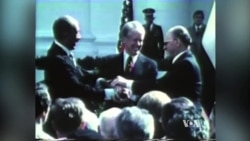Jimmy Carter’s popularity plummeted at the end of his presidency, as his administration struggled to free hostages taken by Iranian revolutionaries.
The hostage crisis ultimately overshadowed one of his greatest achievements: negotiating a 1978 peace agreement between Israel and Egypt.
However, a new book and play by Lawrence Wright provide a unique look at what it took to create lasting peace between two historic enemies.
Wright, an author and playwright, received a Pulitzer Prize for his best-selling nonfiction book,The Looming Tower, and praise for his one-man stage production, My Trip to Al-Qaida.
A call from a Carter adviser
But he received a different kind of story pitch during a phone call in 2011 from Gerald Rafshoon, former U.S. President Jimmy Carter’s media adviser.
Lawrence recounted, Rafshoon’s “pitch was, when a born-again Christian, a pious Muslim and an Orthodox Jew go behind closed doors for 13 days and emerge with the only durable peace treaty in the region.”
Lawrence is talking about the Camp David Accords.
Wright learned that the idea of bringing Egyptian President Anwar Sadat and Israeli Prime Minister Menachem Begin to the Camp David presidential retreat was based on misunderstandings - and Carter’s lofty hopes for success.
“I think he was incredibly naïve when he decided to take these two honorable men, as he saw them, just put them behind closed doors - they’ll get to know each other,” Lawrence said.
'It was naive, yes'
“It was naive, yes. But I knew that both the people of Israel and Egypt wanted peace, and the Palestinians certainly wanted peace,” former President Jimmy Carter said.
Carter’s quest for peace required his greatest diplomacy skills and restraint, aided by his wife, Rosalynn.
Rosalynn Carter remembers, “The 13 days of Camp David had been so tense. You're feeling on top of the world, and the next minute, when you thought peace was not going to be made, you were at the depths of despair.”
Former Vice President Walter Mondale, agreed, saying, “I've often said after a week of that, they would've signed anything to go home.”
Mondale said it was worth criticism heaped on the administration for taking so much time to focus on one issue.
“This was and is the only great breakthrough with Israel and the Arab world through history and that treaty still holds,” Mondale said.
Camp David, the play
Much of that drama is the thrust of Wright’s play, Camp David, which premiered in Washington earlier this year.
Wright said he wasn’t satisfied with just the 90-minute stage production. He realized there was very little written about what he describes as one of the greatest diplomatic achievements in U.S. history.
“When I started researching Camp David, and realizing how significant it is, and how little understood and appreciated this remarkable triumph of diplomacy is ... it’s very unusual in all of history for a mediating power like the United States to achieve peace between two warring powers,” Wright said.
Wright’s book, Thirteen Days in September, is the result of his effort to provide new understanding of Carter’s diplomatic victory.
Its release comes amid continued unrest in the Middle East.
“My goal is to widen people’s perspective,” Wright said. “Everybody has such decided opinions about the Middle East. That’s part of the problem."
Wright hopes his book and stage production enlighten readers and audiences worldwide, but he said the immediate goal is bringing the Camp David play to New York City.






